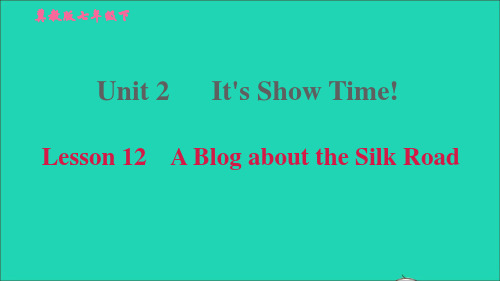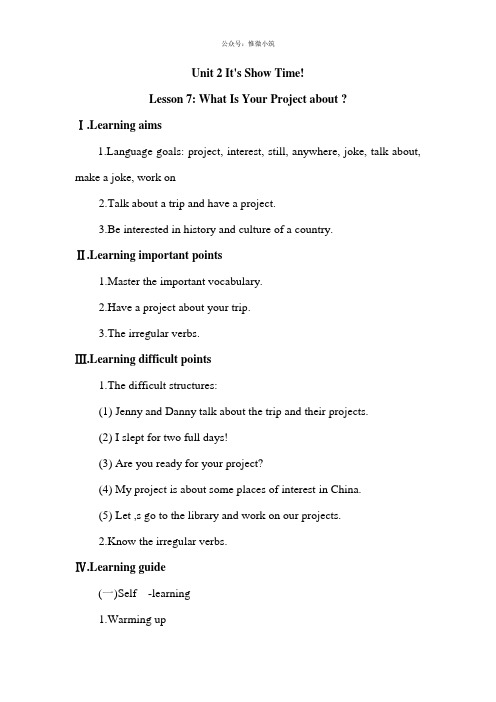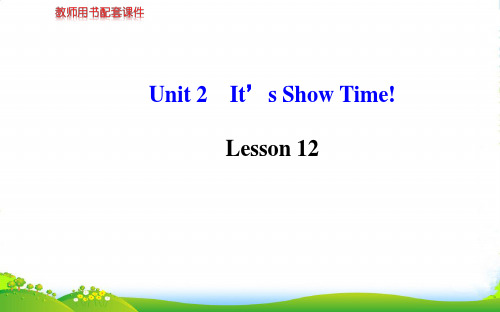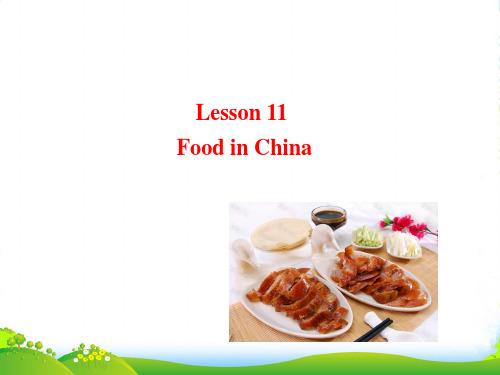冀教七年级英语下册Unit 2 It's Show Time Lesson 8 Marco Polo and the Silk Road 课件1
冀教版七年级英语下册Unit2 It’s Show Time! Lesson11课件

product n. This silk product is very beautiful. worth adj. The book is worth reading. hand-made adj. Lanzhou noodles are long hand-made
noodles. once adv.
Tasting China
1
Listen to the dialogues and write true(T) or false(F).
1. Jenny’s favourite dishes were Peking Duck and
Peking noodlesF. ( )
2. Some people eat noodles for
3 Read the lesson and fill the blanks.
Jenny just got back from a trip to the silk Road. She goes online to tell others about the food in China. Her favourite _d_is_h_e_s__ were Peking Duck and Lanzhou noodles. They have a lot ofh_i_s_to_r_y__ behind them. Peking Duck is a true Chinestreea_s_u_r_e____ . Lanzhou noodles are hand-made noodles. Thetays_te_____ delicious.
3. 这个人做面这么快。就像魔术! The man made the noodles ___so___ _f_a_s_t__. It __w_a_s__ _l_i_k_e__ magic! 4. 我曾经在我们的城市吃过北京烤鸭。 I _o_n_c_e__ had _B_e_i_ji_n_g_D_u__ck__ in our city.
七年级英语下册Unit2It'sShowTimeLesson12习题课件新版冀教版

9. 我用一种新的方式看到了我自己国家的历史 和文化。 I saw ___m__y___ ___o_w_n___ history and culture ____in____ a new way.
10. 我希望有一天能够游览我国更多的地方。 I hope ____to____ __t_r_a_v_e_l _ __m__o_r_e__ __a_ro_u__n_d_ my country someday.
a lot.
—My pleasure.
【中考•滨州】
A. information
B. news
【C点. 拨su】gg由es句tio中n 的不定冠词a可知,D空. a处dv应ic选e 可数名
词单数suggestion建议; 而A项“信息”、B项“新
闻, 消息”、D项“建议”均为不可数名词。故选C。
一、单项选择
4. I was glad to hear you were ___a_li_v_e__ (活着的) and well.
5. Here are my __s_u_g_g_e_s_ti_o_n_s__ (建议) on learning English.
二、根据提示完成句子, 并背记英语句子 6. 李明在他丝绸之路的旅途中玩得很开心。 Li Ming ___h_a_d___ ____a____ __g_o_o_d___ __t_i_m_e___ on his trip to the Silk Road.
冀教版七年级下
Unit 2 It's Show Time!
Lesson 12 A Blog about the Silk Road
先练后背
提示:点击 进入习题
答案呈现
1 experience
【冀教版】七年级英语下册:Unit 2 It's Show Time!全单元教案

Unit 2 It's Show Time!Lesson 7: What Is Your Project about ?Ⅰ.Learning aimsnguage goals: project, interest, still, anywhere, joke, talk about, make a joke, work on2.Talk about a trip and have a project.3.Be interested in history and culture of a country.Ⅱ.Learning important points1.Master the important vocabulary.2.Have a project about your trip.3.The irregular verbs.Ⅲ.Learning difficult points1.The difficult structures:(1) Jenny and Danny talk about the trip and their projects.(2) I slept for two full days!(3) Are you ready for your project?(4) My project is about some places of interest in China.(5) Let ,s go to the library and work on our projects.2.Know the irregular verbs.Ⅳ.Learning guide(一)Self -learning1.Warming upAccording to what you have learnt in unit 1, answer the following questions.(1) What did Danny see on his trip to the Silk Road?(2) How did Jenny like the trip ?2.Read the dialogue and answer the questions.(1) What is Danny ,s project about?(2) What is Danny ,s joke?(3) What is the Silk Road about?3.Finish exercise 4 on P19.(二) Showing and exchange1.talk about, talk to / with sb.They are talking about the weather.Don ,t talk to me when I am studying.2.get ready for sth. Get ready to do sth.She is getting ready for supper.She is getting ready to go to Shanghai tomorrow.3.places of interest / interesting placesThere are many places of interest in China.4.work on sth. / doing sth.He is working on a new project.(三) Expansiontalk, say, speak, tell1.They are talking with the teacher.2.I say he likes swimming.3.She can speak English.4.Please tell him to wait for me there.(四)Task in class1.Self -check(1)北京有许多的名胜古迹.(2)那个男孩经常讲笑话.(3)他们正在从事一项新的工作.(4)他们会说英语和汉语.(5)他们正在谈论明天的考试.2.Self -challengeanywhere, somewhere(1) I cannot find my book ___________.(2) I just live __________ in the city.(五)Blackboard design(六)FeedbackLesson 8: Marco. Polo and the Silk RoadⅠ.Learning aimsnguage goals: age, Europe, Asia, journey, king, coal, discover, invent, other, at the age of, be new to2.Know about Marco Polo and the Silk Road.3.Learn to use the simple past tense.Ⅱ.Learning important points1.The important vocabulary.2.Describe things in the past.3.Know about Marco Polo.Ⅲ.Learning difficult points1.The simple past tense.2.Some difficult structures.(1) At the age of 17, he went to China.(2) The Chinese discovered coal and invented paper.(3) These things were new to Marco Polo.(4) I hope to write a book like that someday.Ⅳ.Learning guide(一)Self -learning1.Warming up(1) What do you know about the Silk Road?(2) Do you know Marco. Polo and his Silk Road?2.Read the text and answer the questions.(1) How did Marco. Polo and his brother travel?(2) How long did his journey last?(3) What did he bring back to his home country?3.Finish exercise 3 on P21.(二) Showing and exchange1.at the age o f… / when …years oldHe moved to London at the age of 20 ( when he was 20 years old ).2.discover, inventHe discovered a new star.Who invented the telephone?3.be new to sb.The movie is new to me.4.hope to do sth.I hope to see you again.(三) Expansionother, the other, others, the others1.We study Chinese, English and other subjects.2.He has two sons, one is a teacher and the other is a doctor.3.You should think of others.4.Some students are cleaning the classroom, the others are playing basketball.(四)Task in class1.Self -check(1) She was born in ________(意大利).(2) What a long _________(旅行) it was!(3) The _______(国||王) wanted to have a daughter.(4) ________(煤) is very important in our life.(5) Did you ________(发现) the truth?2.Self -challengeI hope to pass the exam.I hope that I ______ ______ ______ _______.(五)Blackboard design(六)FeedbackLesson 9: Danny ,s School ProjectⅠ.Learning aimsnguage goals: describe, build, ago, army, important, tool, more, try one ,s best, a long time ago, a little bit, make… from …2.Talk about the places of interest.3.Be relaxed and have a good time.Ⅱ.Learning important points1.Master the important vocabulary.2.Talk about the Terra Cotta Warriors.3.Irregular verbs.Ⅲ.Learning difficult points1.Some structures:(1) Just try your best.(2) It is an important tool on the Silk Road.(3) Can you tell us a little bit more, please?(4) We can make clothes from it.2.Irregular verbs.Ⅳ.Learning guide(一)Self -learning1.Warming up(1) Have you ever been to Xi’an?(2) What do you know about the Terra Cotta Warriors?2.Read the dialogue and answer the questions.(1) What is an important tool on the Silk Road?(2) What shirt is Danny wearing?3.Play and guess. One student tries to describe something and theothers try to guess what it is. Take turns to do it.(二) Showing and exchange1. try one ,s best to do sth.They will try their best to finish the work.2.a long time agoThey built the bridge a long time ago.3.a little bitShe is a little bit tired.They ran a little bit slowly.4.make … from, be made from …They made the chair from bamboo.It is made from grape.(三) Expansionimportant, unimportant, importance1.It is an important thing.2.She often forgets something unimportant.3.We all know the importance of learning English.(四)Task in class1.Self -check(1) 我会尽自己最||大努力的.I will ______ ______ ______.(2) 很久以前有个国||王住在这里.A king lived here ______ ______ ______ ______.(3) 我有点累.I am ______ ______ ______ tired.(4) 我们可以用丝绸做衣服.We can ______ clothes ______ silk.(5) 请描述一下你的房间.Please ______ ______ ______.(五)Blackboard design(六)FeedbackLesson 10: Music and DanceⅠ.Learning aimsnguage goals: realize, rich, western, violin, can ,t wait to do sth. take part in, be different from2.Expess praise and encouragement.3.Spend your spare time happily.Ⅱ.Learning important points1.The important vocabulary.2.Express praise and encouragement.Ⅲ.Learning difficult pointsSome difficult points:(1) I am still thinking about our trip to the Silk Road.(2) I can ,t wait to play music for all my friends.(3) I hope so.(4) Why don ,t you learn traditional Chinese dance?(5) Then we can take part in the Spring Festival show together.Ⅳ.Learning guide(一)Self -learning1.Warming upWhat are you good at? Can you sing or dance? Can you draw or play an instrument? Please try to show it to your classmates.2.Listen to the dialogue and answer the questions.(1) What did Li Ming realize on his trip to the Silk Road?(2) What instrument does Li Ming want to learn?(3) What will Wang Mei learn?3.Read the lesson and finish exercise 2 on P25.(二) Showing and exchange1.think aboutHe is thinking about joining the army.2. can ,t wait to do sth.I can ,t wait to go to the concert.3.I hope so / not.4.why don ,t sb do sth. / why not do sth.Why don ,t you ask him for help?Why not ask him for help?5.take part inDid you take part in the match?(三) Expansionthink of, think up, think over1.I often think of my past time.2.He thinks up a good idea.3.I think it over and decide to do that.(四)Task in class1.Self -check(1) We didn ,t _______(认识到) the importance of learning English.(2) The man is very _______(富有的) .(3) She likes to eat _______(西式的) food.(4) They are playing the _______(小提琴).(5) Do you know the _______(跳舞的人) over there?2.Self -challengejoin, take part in(1) Would you like to ______ us?(2) Some students ______ the match?(五)Blackboard design(六)FeedbackLesson 11: Food in ChinaⅠ.Learning aimsnguage goals: get back, ea t… for breakfast2.Learn to describe delicious food in China.3.Master the regular verbs and the irregular verbs.Ⅱ.Learning important points1.Master the important vocabulary.2.Know about the delicious food in China.3.The regular verbs and the irregular verbs.Ⅲ.Learning difficult points1.Some difficult structures:(1) I just got back from a trip to the Silk Road in China.(2) They look good and taste great!(3) I heard that, in China, some people eat noodles for breakfast.(4) Yes, it is ture.2. The regular verbs and the irregular verbs.Ⅳ.Learning guide(一)Self -learning1.Warming upWhat ,s the most famous dish in China?What have you ever eaten?What ,s your favourite dish?2.Listen to the text and write true (T) or false (F).(1) Beijing Duck takes a lot of work to make. ( )(2) Some people eat noodles for breakfast in China. ( )(3) Paul once had Beijing Duck in his city. ( )3.Read the text and finish exercise 3 on P27.(二) Showing and exchange1.get backThey will get back in ten days.2.tasteThe cake tastes delicious.3.I heard (that)…I heard that she liked basketball.4 e trueI hope your dream can come true.(三) Expansionlook, sound, taste, smell, feel1.That piece of music sounds beautiful.2.The flowers smell sweet.3.The silk shirt feels soft.(四)Task in class1.Self -check(1) 我会在两天后回来.I will ______ ______ in two days.(2) 大卫的梦想实现了.David ,s dream ______ ______.(3) 莉莉看起来很开心.Lily ______ ______.(4) 我听说我们明天会参加考试.______ ______ ______ we will take an exam tomorrow.2.Self -challenge我们午饭吃了一些鸡肉和米饭.We ______ some chicken and rice ______ ______. (五)Blackboard design(六)FeedbackLesson 12: A Blog about the Silk RoadⅠ.Learning aimsnguage goals: have a good time, experience, alive, own, suggestion2.Write a passage about a trip with the simple past tense.3.Have a dream and be happy.Ⅱ.Learning important points1.Master the vocabulary.2.Learn to write a passage about a trip.Ⅲ.Learning difficult points1.Some difficult structures:(1) Li Ming had a good time on his trip to the Silk Road.(2) I saw and experienced a lot on the trip.(3) The history of China is so alive in these places.(4) Where should I go next?(5) Does anyone have any suggestions?2.The simple past tense.Ⅳ.Learning guide(一)Self -learning1.Warming upThink about these questions.Where have you travelled? What did you see? Where would you like to go next?2.Listen to the text and answer the questions.What photos did Li Ming bring from his trip?3.Read the text and finish exercise 2 on P29.(二) Showing and exchange1.have a good / great / wonderful timeI hope you can have a good time.2.aliveThe city is alive.3.suggestion, adviceHe gave me some suggestions.He gave me a piece of advice.(三) Expansionexperience v/n1.They experienced a lot in the war.2.We all learn by experience.3.They had an interesting experience.(四)Task in class1.Self -check(1) next, we, do, will, what ?_________________________________________ (2) we, learned, the, a, in, trip, lot .__________________________________________ (3) a, they, water, had, the, great, in, time .__________________________________________ (4) has, China, history, a, long .___________________________________________ (5) our, traveling, eyes, can, open .___________________________________________ (五)Blackboard design(六)Feedback。
冀教版七年级英语下册Unit 2 It’s Show Time!Lesson 7课件

Language Points
1. Jenny and Danny talk about the trip and their projects. 詹妮和丹尼谈论旅游和他们的课题。 1) talk about,谈论。其他短语还有: talk to/with sb.,和某人交谈;give a talk,做报告 2) speak也表示“说”,强调说话的能力,后面一般跟 语言。 He can speak English very well. 他的英语可以说得很好。
good rest. 3. I want to visit many __p_la_c_e_s__ (place) of interest in
China. 4. My brother _is_w__o_r_k_in__g (work) on his project now.
Homework
詹妮和丹尼到底在研究哪些课题呢,请你用自己的 话来描述一下吧。
Unit 2 It’s Show Time!
Lesson 7 What’s Your Project About?
Lead-in
Free Talk
Did you have a trip these days? Tell one of your interesting trips.
Presentation
3.I’m making a joke. 我在开玩笑。 make a joke,开玩笑,joke在此作名词。 joke也可作动词,表示“开玩笑”。 Jim likes joking. = Jim likes making a joke. 吉姆喜欢开玩笑。
Practice
用所给词的适当形式填空
1. I _h_e_a_r_d_ (hear) a lot about the famous writer. 2. My father is very tired. He needs _to__h_a_v_e (have) a
冀教版七年级英语下册Unit 2 It’s Show Time!Lesson 12优质课件

4. This is my ________ house. I bought it last year. 5. —Is there ________ in the classroom? —Yes. Lisa is in the classroom. 答案:4. own 5. anyone
Ⅱ. 单项填空
1、人才教育不是灌输知识,而是将开发文化宝库的钥匙,尽我们知道的交给学生。 2、一个人的知识如果只限于学校学习到的那一些,这个人的知识必然是十分贫乏的2021/10/142021/10/142021/10/1410/14/2021 3:03:23 PM 3、意志教育不是发扬个人盲目的意志,而是培养合于社会历史发展的意志。 4、智力教育就是要扩大人的求知范围 5、最有价值的知识是关于方法的知识。 6、我们要提出两条教育的诫律,一、“不要教过多的学科”;二、“凡是你所教的东西,要教得透彻”2021年10月2021/10/142021/10/142021/10/1410/14/2021 7、能培养独创性和唤起对知识愉悦的,是教师的最高本领2021/10/142021/10/14October 14, 2021 8、先生不应该专教书,他的责任是教人做人;学生不应该专读书,他的责任是学习人生之道。2021/10/142021/10/142021/10/142021/10/14
A. alive
B. live
ห้องสมุดไป่ตู้
C. living
D. all the above
3. —Who can work out the math problem ________ ?
—No one. I think it’s too hard.
A. in a new way
冀教版七年级英语下册Unit 2 It’s Show Time!Lesson 11课件

2)be worth +名词,表示“值得……” It is worth 100 yuan. 它值100元。 be worth doing sth.,值得做某事 The book is worth reading. 这本书值得读。
2.They look good and taste great! 它们看起来不错,尝起来也棒! look, taste均为系动词,后面跟形容词作表语。类似的 还有:feel,觉得;smell,闻起来;sound,听起来; become,变得 The music sounds beautiful. 这音乐听起来动听。
我们,还在路上……
Listen and write true(T) or false(F).
1. Beijing Duck takes a lot of work to make. ( T ) 2. Some people eat noodles for breakfast in China. ( T ) 3. Paul once had Beijing Duck in his city. ( T)
Homework
你还知道哪些其他的美食呢,请借助互联网的 帮助,来介绍一下你的美食吧。
Never too old to learn, never too late to turn. 亡羊补牢,为时未晚。
这一 样个 的人 人所 才受 有的 学教 问育 。超
过 了 自 己 的 智 力 ,
You made my day!
Lesson 11 Food in China
Lead-in
Free Talk
What’s your favourite food? Why do you like the food?
冀教版七年级下册英语精品教学课件 unit 2 It's Show Time! Lesson 10

05 Language points
② join多指加入某组织并成为其中的一员,如加入某党派、 某俱乐部或某社会团体,以及参军等,还可表示加入某人的行列 中,即 join sb.。 例:He joined the league in 1985.他在1985年加入联盟。
Unit 2 It's Show Time!
Lesson 10 Music and Dance
冀教英语七年级下册教学课件
01 Learning Targets
Key words & phrases: realize, rich, western, violin, think about, play music, take part in, can't wait to do sth.,be different from Key sentences: 1. I realized many things. 2. I want to learn to play the erhu!
③join in 意为“参加”,后面一般接表示竞赛、娱乐、游戏 等活动的名词或动名词。 例:Can I join in your game?我能参加你们的游戏吗?
I hope that everyone will be able to join in the fun. 我希望每个人都能够加入进来,玩得开心。
A lion is different from a tiger. Don't forget. 狮子和老虎不一样。别忘了。 Your hat is the same as mine, right? 你的帽子和我的帽子一样,是吗?
冀教版英语七年级下册Unit 2 It’s show time!(第7课到第12课)教学设计

Unit 2 It’s show time!Lesson 7:What’s your project about?一、教学分析教学重点:1.掌握词汇:project, interest, still, anywhere, joke,places of interest, talkabout, make a joke, work on.2.掌握句型:—What’s your project about?—My project is about….I will talk about….教学难点:1.正确使用重点句型:—What’s your project about?—My project is about….2.正确使用一般过去时:was主语+be +表语.were主语+V-ed(动词的过去式) +其它.二、教学目标:语言知识:(1)学习和掌握有关旅行和课题的词汇。
(2)学习和掌握询问课题内容的句型:—What’s your project about?—My project is about….I will talk about…….(3)学习和掌握感官动词feel的用法:feel +adj.(4)熟练运用一般过去时来叙述旅行中所见所闻,熟练运用一般将来时来介绍将要谈论的课题内容。
三、教学准备多媒体课件、录音机四、教学步骤Step 1:激趣导入Teacher shows a picture of place of interest, and let students saysomething they know about that.Step 2:自主学习1.Teacher shows a photo which took from above places of interest, and introduces her own trip. Then invite two students to introduce their trips.2.Teach the new words of this lesson and match words with the correctmeanings.3.Teacher let students listen to the tape and answer the following questions:(1)How was Jenny’s trip?(2)What’s Jenny’s project about?(3) What’s Danny’s project about?(4)What is Silk Road about?4.Listen again and choose True or False.5.Divide students into 9 groups as usual. Six students are in a group. Let students read the conversation in their groups, and discuss the important grammar points.Step 3:交流展示1.Let a group of students read the conversation, and others read after them.2.Let another group of students to analyze the important points.3.Fill in the blanks on Page 19.4.Work in pairs ,introduce their own trip to partners, and talk about their projects.Step 4:点评解疑What’s your project about?/My project is about….I will talk about….Step 5:练习总结1.Let some students sum up the contents they have learnt.They are expected to sum up the key words, phrases and sentence patterns. They should sum up when and how to use Simple Past Tense.2.Homework:Write down the conversation which about a place ofinterest and draw a picture of it.五、教学反思Unit 2 It’s show time!Lesson 8:Marco Polo and the Silk Road一、教学分析教学目标:通过本课的学习,让学生能够熟练掌握一般过去时,并利用其做口头报告来介绍某位名人的生平。
- 1、下载文档前请自行甄别文档内容的完整性,平台不提供额外的编辑、内容补充、找答案等附加服务。
- 2、"仅部分预览"的文档,不可在线预览部分如存在完整性等问题,可反馈申请退款(可完整预览的文档不适用该条件!)。
- 3、如文档侵犯您的权益,请联系客服反馈,我们会尽快为您处理(人工客服工作时间:9:00-18:30)。
Words Review
• • • • • • • • • • • • • interest n. Italy n. age n. goods n. European n. Asia n. journey n. king n. coal n. discover v. invent v. other adj. travel v.
兴趣 意大利 年龄 商品;货物 欧洲 亚洲 旅行;旅程 国王 煤炭 发现;了解 发明;创造
其他的;另外的 旅行;旅途
1.trade with sb 与某人做生意 The country trades with a lot of European countries. trade sth for sth.用某物交换某物 I traded information for money 2.eventually adv.最后,终于,结果 He worked very hard and eventually made himself ill.
some structures
(1) At the age of 17, he went to China. (2) The Chinese discovered Add your title in coal here and invented paper. (3) These things were new to Marco Polo. (4) I hope to write a book like that someday.
3.be impressed by(at, with) 被—感动,给 留下----印象 (be struck by) I was deeply impressed by his speech. 4.in turn 依此,替换地 They sang on the stage in turn.
5.amaze vt.To fill with great surprize; cause wonder in 吃惊,使惊奇 be amazed by 对(因)---大感惊讶 We were amazed at the news. be amazed to do We were amused to hear the news. be amused that I was amused that he had made such rapid progress in English.
10. confuse. Vt. to mislead. cause to be mistaken.使人困惑,使弄错. The difficult question confused him. be confused by 对(因)---感到困惑 People were confused by a lot of information.人们被大量的信息搞糊涂了.
11.persuade. Vt. 说服,劝说. • persuade sb to do sth. 说服了某人做某 事 • advise sb to do sth. 劝说某人做某事 • She finally persuaded her son to go to college. • I advised him to stop smoking, but he wouldn’t listen .
Marco Polo
Marco Polo (1254-1324), a Venetian trader and explorer who was famous for his worldwide travels. His famous book is The Description of the World.
9.pay.vt. To give money to someone in turn for goods bought, work done, etc. 付款,支付. I paid $5 for that book. Did you pay for that, sir? pay for 付---的款,受---报应 pay in 缴纳(款项) pay into 把钱存入(银行,帐户) pay off 全部还清 I have paid off all my debts.
8.available adj. able to be got, obtained, used, seen.etc. 可得到的.可 用的,可看见的 (opposite unavailable) Is the library available during summer vacation? There shoes are not available in your size. The doctor is not available now.
Useful words and expressions
• • • •
• • • • • •
1.trade with.和---做交易. 2.eventually.最后,终于 3.be impressed by给留下---印象 4 to send sb on many important missions. 派遣某人完 成---使命. 5.in turn 依此.;轮流 6.be amused by 对---感到好笑. 7.be awed by 对---感到畏惧 8.describe as 把---描述成 9.be covered in 封盖 10.dine 6000 people 供 6000人进餐
6.awe vt.使产生敬畏之心. They were awed into silence by the king. 国王的威严使他们肃然无声.
7.describe --- as 把---说成 describe+名(oneself) + as形(名) He described my plan as unrealistic. 他批评我的计划不切实际. describe himself as an artist自称艺术家
U
N
Iห้องสมุดไป่ตู้
T
2
It’s S ho w T i m e !
L/O/G/O
Lesson 8
Marco Polo and the Silk Road
Grammar structure
the simple past tense
主语+动词过去式+宾语+其他
Eg: In 1275, Marco Polo travelled to Beijing.
